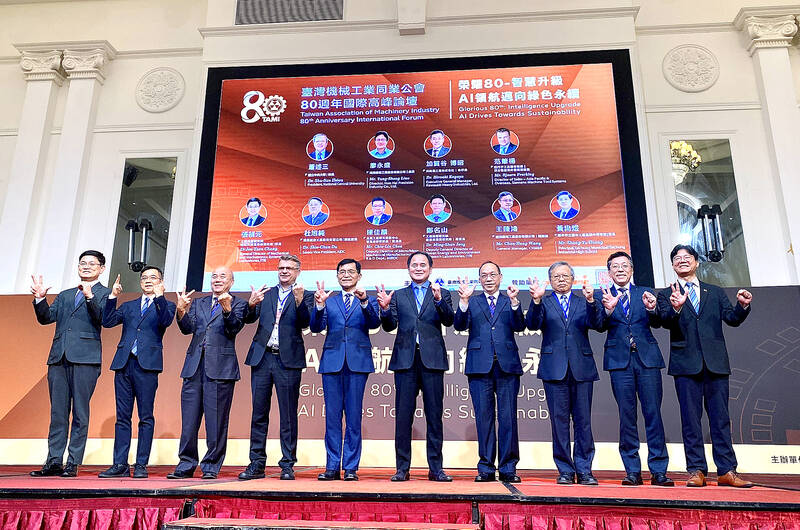Taiwanese machinery manufacturers facing US tariff challenges and unfavorable exchange rates must provide customized products or services to secure orders and regain customer loyalty, a Taiwan Association of Machinery Industry (TAMI) official said yesterday in Taichung.
“Taiwan’s machinery export market is shrinking,” the Chinese-language Liberty Times (the Taipei Times’ sister newspaper) quoted TAMI secretary-general Hsu Wen-tung (許文通) as saying on the sidelines of an international forum marking the 80th anniversary of the establishment of the association.
“We can no longer rely on price-performance ratios and after-sales services to retain customers, as exchange rate fluctuations pose a greater disadvantage to our products... Differentiation and customization are needed to attract customers and make it impossible for rivals to compete,” Hsu said.

Photo: Huang Hsu-lei, Taipei Times
For instance, some companies said that order visibility for customized semiconductor, woodworking and food machinery is clear through the first or the second quarter of next year, reflecting their still high international visibility and limited impact by exchange rate changes, he added.
From January to last month, Taiwan’s machinery exports reached US$23.26 billion, an annual increase of 6.6 percent. In New Taiwan dollar terms, the total was NT$725.07 billion, up 3.8 percent, the association’s data showed, an indication that the NT dollar’s appreciation this year has eroded the real growth of export value.
Taiwan’s price advantage — with machinery equipment priced 20 to 30 percent lower than Japanese products — has effectively disappeared, as from 2021 to Oct. 8, the NT dollar depreciated only 7.4 percent, compared with the yen’s 48.1 percent plunge, the association said in a statement.
Given unfavorable exchange rates, “Japan’s high-end products are almost all cheaper than Taiwan’s,” Hsu said.
A stronger NT dollar has an even greater impact than US tariffs, with the effect especially evident in machine tool exports, the association said.
From January through last month, Taiwan’s machine tool exports totaled US$1.52 billion, down 6.4 percent from US$1.63 billion for the same period last year, association data showed.
While competing with Japan and South Korea on the high-end segment, Taiwan’s machinery makers also compete with Chinese firms on the low to middle end.
However, after Chinese firms’ aggressive international expansion over the past few years and a spree of acquisitions of many European and US companies, the quality and output of Chinese products have increased rapidly, Hsu said.
In particular, China’s low-priced steel — only one-third of Taiwan’s — and lower production costs are also making it difficult for Taiwanese makers to compete with their Chinese peers in Southeast Asia, he said.
Speaking at the international forum, Vice Minister of Economic Affairs Ho Chin-tsang (何晉滄) said the Legislative Yuan on Friday passed the Executive Yuan’s special resilience budget, which includes a NT$46 billion (US$1.5 billion) spending plan proposed by the Ministry of Economic Affairs to help local industries bolster their resilience and competitiveness.
The ministry would step up efforts to help companies in terms of financial support, technology upgrading and talent development, as well as assist them in integrating artificial intelligence into their operations and entering global supply chains, Ho said.

In Italy’s storied gold-making hubs, jewelers are reworking their designs to trim gold content as they race to blunt the effect of record prices and appeal to shoppers watching their budgets. Gold prices hit a record high on Thursday, surging near US$5,600 an ounce, more than double a year ago as geopolitical concerns and jitters over trade pushed investors toward the safe-haven asset. The rally is putting undue pressure on small artisans as they face mounting demands from customers, including international brands, to produce cheaper items, from signature pieces to wedding rings, according to interviews with four independent jewelers in Italy’s main

Japanese Prime Minister Sanae Takaichi has talked up the benefits of a weaker yen in a campaign speech, adopting a tone at odds with her finance ministry, which has refused to rule out any options to counter excessive foreign exchange volatility. Takaichi later softened her stance, saying she did not have a preference for the yen’s direction. “People say the weak yen is bad right now, but for export industries, it’s a major opportunity,” Takaichi said on Saturday at a rally for Liberal Democratic Party candidate Daishiro Yamagiwa in Kanagawa Prefecture ahead of a snap election on Sunday. “Whether it’s selling food or

CONCERNS: Tech companies investing in AI businesses that purchase their products have raised questions among investors that they are artificially propping up demand Nvidia Corp chief executive officer Jensen Huang (黃仁勳) on Saturday said that the company would be participating in OpenAI’s latest funding round, describing it as potentially “the largest investment we’ve ever made.” “We will invest a great deal of money,” Huang told reporters while visiting Taipei. “I believe in OpenAI. The work that they do is incredible. They’re one of the most consequential companies of our time.” Huang did not say exactly how much Nvidia might contribute, but described the investment as “huge.” “Let Sam announce how much he’s going to raise — it’s for him to decide,” Huang said, referring to OpenAI

The global server market is expected to grow 12.8 percent annually this year, with artificial intelligence (AI) servers projected to account for 16.5 percent, driven by continued investment in AI infrastructure by major cloud service providers (CSPs), market researcher TrendForce Corp (集邦科技) said yesterday. Global AI server shipments this year are expected to increase 28 percent year-on-year to more than 2.7 million units, driven by sustained demand from CSPs and government sovereign cloud projects, TrendForce analyst Frank Kung (龔明德) told the Taipei Times. Demand for GPU-based AI servers, including Nvidia Corp’s GB and Vera Rubin rack systems, is expected to remain high,